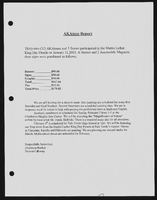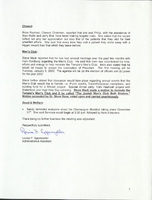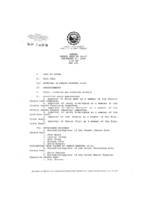Search the Special Collections and Archives Portal
Search Results

Transcript of interview with Robert "Bob"Agonia by Marcela Rodriguez-Campo, September 6, 2018
Date
Archival Collection
Description
Robert “Bob” Agonia (1938- ) was born in Garden Grove, California on a migrant camp made up of Filipino and Mexican-American workers. Agonia’s father was a farmer on a 70 acre farm owned by the Beggs family. Agonia did not spend much time living on the migrant camp, as his father moved the family to a private residence when Agonia was four. Agonia attended school, during an era of school desegregation in Garden Grove. He recalls that his mother dealt with segregation during her schooling, being forced to attend a school miles down the road from her home despite living across the street from another school. Agonia recalls his community being very diverse with families sharing Filipino and Mexican-American heritage and his neighbors being Japanese Americans. Agonia participated in a multicultural Boy Scout troop. After high school, Agonia joined the Peace Corps and served in El Salvador. While there, Agonia worked in an agricultural research center in Santa Tecla where he helped local farmers select the proper insecticide for their crops. After the Peace Corps, Agonia had his choice of government jobs, ultimately selecting to work for the Internal Revenue Service. Agonia’s work with the IRS is what eventually brought him from California to Las Vegas. He quickly realized that the type of IRS cases he would be handling in Las Vegas were completely different from the work he was accustomed to in California. One of those unique cases required him to close the doors of a downtown casino. Since moving to Las Vegas, Agonia was critical in establishing a Las Vegas LULAC chapter, an American GI Forum, an EEO council, and the UNLV Engineering school.
Text

Transcript of interview with Frankie Perez by Elsa Lopez and Laurents Bañuelos-Benitez, November 5, 2018
Date
Archival Collection
Description
Frankie Perez (1986- ) is an individual that constantly found himself navigating two worlds, whether it was military versus civilian; female versus male; or being Latinx in the United States. As a result of this navigation, Perez has a unique perspective on our ever more complicated world that not many individuals possess. Perez served in the military during the Do Not Ask, Do Not Tell policy which made it difficult for someone dealing with gender identity, to seek out the proper support they need. Despite the policy, and other policies that were put in place afterwards to inhibit the transgender community in the military, Perez began his transition while still serving his country. In direct contradiction of popular opinion, Perez discovered that the military easily accommodated his transition. Outside of the military Perez is an active voice in the LGBTQ community. As a member of the LGBTQ, Latinx, and military community, Perez has a unique perspective that he uses to fight for both LGBTQ and Latinx rights. Currently, Perez is finishing his degree in gender and sexuality studies at UNLV. He hopes to use his education to help people have the difficult discussions and improve conditions for his communities.
Text

Transcript of interview with Helen Naugle by Irene Rostine, October 31, 1996
Date
Archival Collection
Description
Prior to 1962, Helen Naugle had only visited Las Vegas once in her life while traveling from Idaho to California for a vacation with her husband and her boss. The group made a quick stop so her boss could interview for a position with EG&G and, as fate would have it, EG&G did not hire Helen’s boss. However, they did extend a job offer to Helen’s husband. A month later, Helen, her two daughters, and her husband became residents of Las Vegas, Nevada. Before moving to Nevada, Helen enjoyed singing in super clubs and performing on her radio show, “Melodies from Meadowland” and working for American Machine and Foundry. Upon her arrival in Las Vegas, Helen went to work for Bonanza Airlines before attending real estate school. In 1963, Helen opened her first office, Bruce Realty, and in 1965, she obtained her Broker’s license. She spent the next ten years selling general real estate. During this period, Helen was an active member of the Board of Realtors, as well as an early participant in the Board’s newly formed Women’s Council. Fate would strike again in Helen’s life while she was visiting her daughter at college in Arizona where she read an article in the Phoenix newspaper about a group of brokers who had formed a networking association to sell hotels and motels across the country. As a result of her initial contact with this association, Helen spent the next four decades selling hotels and motels throughout the State of Nevada, including Las Vegas, Elko, Tonopah, and Wells. She eventually became the first woman President of the American National Hotel-Motel Association. The cultural diversity of hotel and motel buyers would provide Helen with opportunities to travel the world and work with buyers from many different countries and cultural backgrounds. It also led to Helen’s membership in the FIABCI (International Real Estate Federation) and her Certified International Property Specialist and Federation of International Property Consultants certifications. Helen was also selected by the Association to represent the Air Force as “Innkeeper Evaluator” for one year. This honor took her to five Air Force bases in the United States and to Clark Air Force Base in the Philippines. During Helen’s career in hotel and motel real estate sales, she witnessed the transition from “mom-and-pop” American buyers to the influx of international buyers predominately from East India and Asia. The opportunities for helping repeat buyers and sellers gradually went away, as foreign buyers entered the market and tended to resell their properties to friends and family members from their own countries. During the latter part of her career, Helen found time to give back to the Las Vegas community through her volunteer work helping to establish the Scleroderma Foundation of Nevada. She also served on the Board of Directors of the Downtown Las Vegas Partnership where she focused on public safety in the area encompassing the Fremont Street Experience. Her work with both of these organizations allowed her to draw on her career experience for the benefit of others. Whether it was fate, or as Helen put it, she “just lucked into a lot of things,” one thing is certain - Helen Naugle was certainly a trail blazer for women in the hotel-motel niche of the real estate business, not only in Nevada, but across the nation.
Text

Alpha Kappa Alpha Sorority, Theta Theta Omega Chapter meeting agendas
Date
Archival Collection
Description
From the Alpha Kappa Alpha Sorority, Incorporated, Theta Theta Omega Chapter Records (MS-01014) -- Chapter records file.
Text

Alpha Kappa Alpha Sorority, Theta Theta Omega Chapter AKAteens reports
Date
Archival Collection
Description
From the Alpha Kappa Alpha Sorority, Incorporated, Theta Theta Omega Chapter Records (MS-01014) -- Chapter records file.
Text

Transcript of interview with Sarah & Joni Fried by Barbara Tabach, March 4, 2016
Date
Archival Collection
Description
The website for Freed’s Bakery happily displays the headline: Baking Sweet Memories Since 1959. Today the third generation of Frieds (correct spelling of the family surname) is hard at work creating incredible wedding cakes, cookies, and delightful desserts for the Las Vegas valley. For this oral history interview, Joni Fried, her daughter Sarah Fried, and nephew Max Jacobson-Fried sit to share stories of working in the family business started by Joni’s parents Milton and Esther Fried. Joni has handed the reins over to the third generation who invest their delicious souls into maintaining this Las Vegas tradition. Their tales range from childhood memories of holidays baking and cleaning to their personal favorite desserts. They also explain the impact on their business as early adapters of computer technologies and social media marketing. In October 2017, Freed’s Bakery landed a TV show, Vegas Cakes, on the Food Network.
Text

Minutes from Temple Beth Sholom Board of Directors meetings, June 1999 - December 1999
Date
Archival Collection
Description
Meeting minutes include reports from committees of the board, correspondence, and balance sheets.
Text
Christine Hess (Nevada Housing Coalition) oral history interview conducted by Kellian Beavers and Saha Salahi: transcript
Date
Archival Collection
Description
From the Lincy Institute "Perspectives from the COVID-19 Pandemic" Oral History Project (MS-01178) -- Community organization interviews file.
Text

Transcript of interview with Ernest Jackson Jr. by Larry E. Cooper, March 1, 1980
Date
Archival Collection
Description
On March 1, 1980, Larry E. Cooper interviewed general contractor Ernest (Ernie) Jackson Junior (born December 6th, 1932 in Bruce, Mississippi) in Cooper’s home about his experiences in the Westside as a Black Las Vegas resident. Jackson Jr. discusses the lack of property buyers on the Westside and his goals of improving the Westside by building on the land. Jackson Jr. also discusses his youth as a baseball star for Las Vegas High School in the fifties.
Text

Meeting minutes for Consolidated Student Senate University of Nevada, Las Vegas, September 27, 1990
Date
Archival Collection
Description
Text
